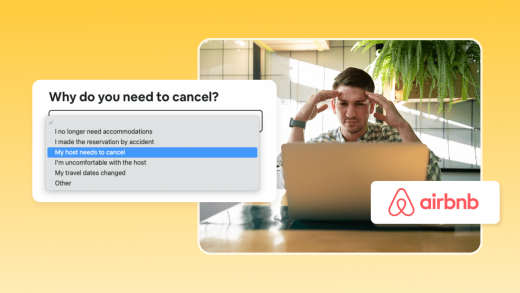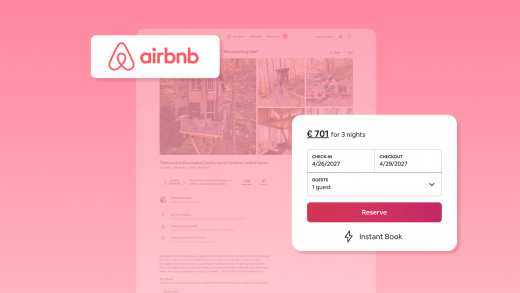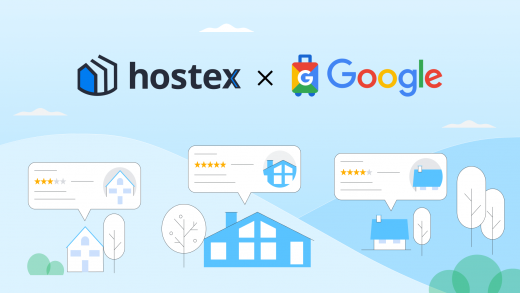L'appello di investire in affitti per le vacanze risiede nel loro potenziale di rendimenti elevati. Ma nel mercato altamente competitivo odierno, possedere un Airbnb è ancora redditizio?
In questa guida, analizzeremo approfonditamente questo aspetto. Che tu sia proprietario di un immobile, investitore immobiliare o alle prime armi con gli affitti a breve termine, la nostra analisi ti aiuterà a prendere decisioni di investimento intelligenti su Airbnb.
Se stai cercando un modo semplice per semplificare le tue operazioni Airbnb, prendi in considerazione l'utilizzo di Ospite — automatizza oltre 70% di attività giornaliere di noleggio a breve termine per soli $4,9 al mese, dandoti più tempo per concentrarti su ciò che conta di più.
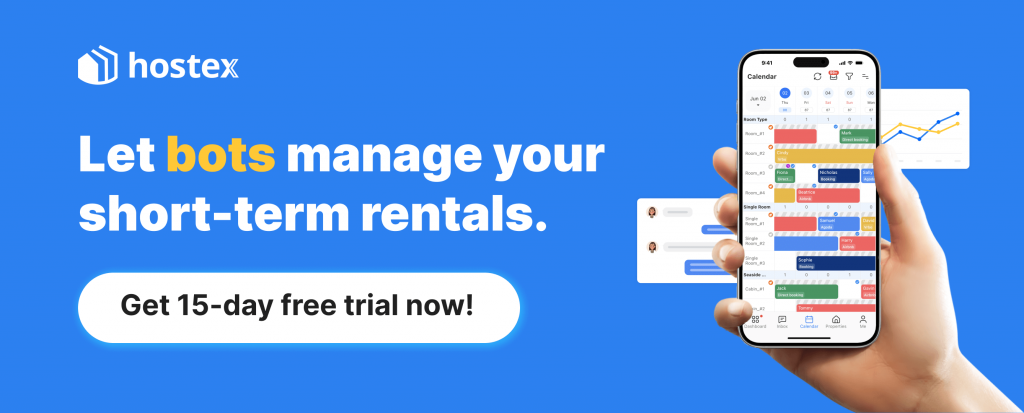
Possedere un Airbnb è ancora redditizio?
Andiamo dritti al punto: la risposta è SÌ.
Ecco cosa dicono i dati:
- Un host Airbnb statunitense medio guadagna $14.000 di reddito supplementare all'anno, con guadagni mensili medi pari a $4.300 (DNA aereo).
- Ricavi di Airbnb nel terzo trimestre del 2024 ha raggiunto $3,7 miliardi, con una crescita di 10% su base annua.
- Attualmente, l'Europa conta 9 milioni di annunci di affitti a breve termine, mentre il Nord America supera i 4,5 milioni. Anche Asia, America Latina e Oceania stanno registrando una rapida crescita.
- 66% dei gestori immobiliari prevedono una crescita dei ricavi nel 2025 (Previsioni del settore degli affitti per le vacanze per il 2025 secondo Key Data).
- Si prevede che il mercato globale degli affitti a breve termine raggiungerà 172 miliardi di dollari entro il 2030 (Ricerca e mercati).
Questa domanda in forte espansione dimostra che gli affitti a breve termine rimangono altamente redditizi. Tuttavia, la crescente concorrenza impone agli host di adottare strategie più intelligenti per rimanere competitivi.
Quali sono i vantaggi di possedere un Airbnb rispetto agli affitti tradizionali?
Rispetto agli affitti tradizionali, gestire un Airbnb offre chiari vantaggi in termini di potenziale di guadagno, flessibilità, diversità degli ospiti e controllo della proprietà.
1. Potenziale di reddito più elevato
- Prezzi dinamici e premi stagionali: Adeguare le tariffe in base alla domanda, soprattutto durante i periodi di punta o durante i grandi eventi.
- Maggiore occupazione, minori costi di locazione: Media degli affitti a breve termine 70% + occupazione nelle località turistiche più gettonate (AirDNA), con risultati migliori rispetto agli affitti a lungo termine.
- Crescita della domanda globale: A differenza degli affitti a lungo termine incentrati sulla clientela locale, Airbnb sfrutta viaggiatori internazionali, con una domanda annuale in crescita a 22%.
2. Opportunità di entrate extra
- Affitti tradizionali offrono solo reddito fisso.
- Esperienze Airbnb:Gli host guadagnano un reddito extra offrendo attività (ad esempio corsi di cucina, visite guidate).
- Servizi aggiuntivi: La pulizia, i pacchetti pasto, ecc. possono aumentare i profitti 20-30%.
3. Profili degli ospiti diversificati
- Attrae turisti internazionali, viaggiatori d'affari, nomadi digitalie altro ancora.
- Soddisfare nicchie di mercato (ad esempio famiglie, backpacker) con soggiorni unici (case sulla spiaggia, case sugli alberi).
- 83% dei millennial preferire esperienze personalizzate e locali agli hotel.
4. Miglior controllo della proprietà
- Orari flessibili: Blocca le date o stabilisci limiti massimi di soggiorno senza preoccuparti dei contratti di locazione a lungo termine.
- Recensioni bidirezionali: Controlla gli ospiti e rifiuta le prenotazioni rischiose.
- Integrazione tecnologica intelligente: Utilizzare serrature intelligenti (ad esempio SmartLock) per il controllo dell'accesso remoto e per la sicurezza.
Insomma, possedere un Airbnb consente maggiori guadagni e flessibilità, ma richiede una gestione attiva per massimizzare i profitti.

Le sfide di possedere un Airbnb
Sebbene Airbnb offra opportunità, gli host devono anche affrontare sfide significative:
1. Pressioni politiche e normative
- Restrizioni locali:Molte città limitano i permessi di locazione a breve termine o impongono tasse più elevate per alleviare la carenza di alloggi.
- Rischi di conformità:Le normative diverse da regione a regione aumentano i costi legali e la complessità.
- Tassare incertezza: Improvvisi cambiamenti di politica economica (ad esempio, la tassazione in Canada dei soggiorni Airbnb a lungo termine come reddito commerciale) possono ridurre drasticamente i profitti.
2. Intensa concorrenza di mercato
- Mercato sovraffollato: Con Oltre 8 milioni di annunci su Airbnb, distinguersi è difficile: l'alloggio 60% non ha un fascino particolare.
- Guerre dei prezzi:In città come Chiang Mai, le tariffe notturne sono scese a $15–20, con predominanza di appartamenti economici.
- Concorso alberghiero:Gli hotel tradizionali offrono ormai prezzi competitivi e servizi standardizzati.
3. Complessità operativa e aumento dei costi
- Compiti che richiedono molto tempo: Gli adeguamenti dei prezzi, la comunicazione con gli ospiti e la manutenzione richiedono un'attenzione costante.
- Costi di servizio più elevati:Le pulizie e le riparazioni stanno diventando più costose a causa dell'aumento del costo della manodopera.
- Spese di marketing:Gli host devono investire in SEO, pubblicità o siti di prenotazione diretta per rimanere visibili. (Suggerimento: strumenti come Ospite automatizzare 70% di attività ripetitive e contribuire a creare siti di prenotazione diretta senza commissioni.)
4. Volatilità del reddito e cambiamenti del mercato
- sensibilità economica: Le recessioni o le crisi (come il COVID-19) riducono la domanda: le prenotazioni del Nord America nel 2024 sono cresciute solo 7% contro l'Asia 22%.
- oscillazioni stagionali:I guadagni estivi a Seattle possono essere 5x reddito invernale, ma la concorrenza o le normative possono ridurre i guadagni di picco.
- Finestre di prenotazione più brevi: Gli ospiti ora prenotano 1 mese in anticipo (rispetto a 2 mesi), aumentando i rischi di posti vacanti.
5. Rischi legali e di proprietà
- controversie sui danni:Gli ospiti potrebbero danneggiare la proprietà o violare la privacy (ad esempio, con telecamere nascoste), lasciando che siano gli host a farsi carico delle riparazioni.
- Politiche della piattaforma: Le regole sui rimborsi di Airbnb (ad esempio i rimborsi completi per COVID-19) hanno scatenato cause legali da parte degli host.
- Ostacoli alla conversione:Il passaggio agli affitti a lungo termine spesso richiede costose ristrutturazioni e nelle zone turistiche la domanda è bassa.

Come fare soldi con Airbnb: strategie chiave per aumentare i profitti
Non c'è dubbio che, come nella gestione di qualsiasi attività, gli host di Airbnb debbano valutare come massimizzare il proprio potenziale di guadagno. Ecco alcuni passaggi concreti per garantire il successo a lungo termine:
Strategia 1: ridurre i costi operativi di Airbnb
Nell'attuale mercato competitivo di Airbnb, una gestione intelligente dei costi è fondamentale per la redditività.
Tuttavia, non tutte le spese sono negoziabili: tasse, spese condominiali e costi di servizio di Airbnb sono fissi. Concentrati su ciò che puoi controllare.
1. Ottimizzare gli acquisti
- Valutare preventivi e servizi di diversi fornitori per scegliere i partner più convenienti.
- Considera l'acquisto all'ingrosso per ottenere offerte migliori. Questo approccio in genere consente di risparmiare. Da 15% a 30% sulle spese.
2. Risparmiare energia
Utilizzando elettrodomestici a basso consumo energetico e misure ecosostenibili è possibile ridurre significativamente i costi, contribuendo al contempo alla salvaguardia dell'ambiente.
- Considerare l'installazione GUIDATO lampadine, sensori di movimento, termostati intelligenti ed elettrodomestici ad alta efficienza.
- Affiggere suggerimenti per risparmiare acqua nel tuo alloggio in affitto incoraggia gli ospiti a risparmiare, riducendo ulteriormente la bolletta dell'acqua.
Secondo il Dipartimento dell'Energia degli Stati Uniti, gli host possono risparmiare Da 10% a 30% sulle bollette delle utenze elettriche adottando pratiche di risparmio energetico.
3. Manutenzione regolare
Stabilire un programma di ispezione e manutenzione periodica è fondamentale per tutti gli host Airbnb. Controllare regolarmente elettrodomestici, impianti idraulici e impiantistica garantisce il buon funzionamento dell'abitazione.
Questo approccio proattivo aiuta a identificare potenziali problemi prima che si trasformino in costose riparazioni.
La manutenzione ordinaria può ridurre Da 30% a 50% delle spese impreviste, proteggendo la tua proprietà e aumentando la soddisfazione degli ospiti.
4. Costi di marketing inferiori
Le spese di marketing possono accumularsi rapidamente, ma esistono dei modi per ridurle al minimo:
- Collaborare con le aziende locali: Collabora con ristoranti e attrazioni nelle vicinanze per ottenere referenze reciproche. Partecipare a eventi locali può anche attrarre più visitatori nella tua struttura.
- Sfrutta i social media: Assumi un fotografo professionista per scattare immagini di alta qualità del tuo spazio e condividerle su Facebook, Twitter o Instagram. In questo modo, raggiungi efficacemente il tuo pubblico di riferimento senza dover spendere cifre ingenti in pubblicità.
5. Implementare strumenti di automazione
Utilizzando un software di gestione Airbnb come Ospite può migliorare significativamente l'efficienza operativa. L'automazione riduce la necessità di lavoro manuale, riducendo i costi di manodopera.
Processi come la gestione delle prenotazioni, la sincronizzazione del calendario, la comunicazione con gli ospiti e l'assegnazione delle attività di pulizia possono essere tutti automatizzati.
Secondo i dati Hostex, gli host che utilizzano il loro software risparmiano circa 70% sui costi mensili del lavoro.

Strategia 2: Ottimizzazione delle strategie di prezzo
Per massimizzare i ricavi, adeguare i prezzi in base alle tendenze del mercato, alla domanda e alle tariffe della concorrenza.
1. Analisi di mercato approfondita
- Analizza i dati storici delle prenotazioni per identificare le stagioni di punta e di bassa stagione per adeguamenti strategici delle tariffe.
- Crea un calendario di eventi e festival locali per adattare i prezzi ai picchi di domanda.
- Monitorare regolarmente i prezzi della concorrenza sulle diverse piattaforme per rimanere competitivi.
2. Stabilire tassi di base per un reddito stabile
- Tieni traccia degli indicatori chiave di prestazione (KPI) come la tariffa media giornaliera (ADR) e il fatturato per camera disponibile (RevPAR).
- Confronta il tuo ADR e RevPAR con quelli dei concorrenti per valutare le prestazioni.
- Identificare le fluttuazioni stagionali e le tendenze del mercato per individuare opportunità di guadagno.
3. Implementare i prezzi dinamici
- Utilizzare strumenti di determinazione automatica dei prezzi (ad esempio Pricelabs) per adattare le tariffe in base alla domanda in tempo reale.
- Creare pacchetti combinati (ad esempio soggiorni + tour) per giustificare prezzi più elevati nei periodi di punta.
- Proponi promozioni a tempo limitato (ad esempio sconti per prenotazioni anticipate) per aumentare le prenotazioni.
4. Prezzi basati sugli incentivi
- Offrire sconti per soggiorni lunghi per incoraggiare le prenotazioni prolungate.
- Premia i clienti abituali con vantaggi esclusivi per fidelizzarli.
- Offrire incentivi per la prenotazione anticipata per garantirsi una prenotazione in anticipo.
Suggerimento professionale: Strumenti come Ospite ti consente di sincronizzare i prezzi su tutte le piattaforme all'istante, garantendo coerenza e risparmiando tempo.

Strategia 3: Ottieni più prenotazioni
Aumentare la visibilità e l'attrattiva del tuo annuncio è il modo più efficace per attrarre potenziali ospiti e aumentare i profitti.
1. Ottimizza il tuo annuncio
La prima impressione è quella che conta: non saltare questo passaggio se hai già investito tempo e denaro nella tua proprietà.
- Foto professionali: Le immagini di alta qualità catturano l'attenzione.
- Elenco dettagliato dei servizi: Elenca chiaramente ciò che offri.
- Descrizione accattivante: Evidenzia le caratteristiche uniche.
- Prenotazione immediata: Abilita per prenotazioni più rapide.
- Politica di cancellazione flessibile: Attrae più ospiti.
2. Mantenere alti tassi di risposta
Negli affitti a breve termine, le risposte rapide migliorano l'esperienza degli ospiti e il posizionamento nei risultati di ricerca, fondamentali per guadagnare Superospite O Preferito dagli ospiti stato.
- Cercare di rispondere entro poche ore (o anche prima).
- Fornire risposte personalizzate (ad esempio, nome dell'ospite, consigli su misura).
Sfrutta il sistema di intelligenza artificiale avanzato di Hostex, HostGPT, che include risposte automatiche e messaggi automatici. Questo strumento consente di inviare comunicazioni efficienti agli ospiti in modo automatico.
3. Ottieni recensioni a 5 stelle
Ogni recensione positiva aumenta il tuo posizionamento su Airbnb e svolge un ruolo fondamentale nel garantire più prenotazioni, influenzando le decisioni dei potenziali ospiti.
Per suggerimenti pratici, consulta il nostro dettagliato guida per ottenere recensioni Airbnb a 5 stelle — una lettura obbligata per gli host che vogliono massimizzare i propri ascolti.
- Stabilisci aspettative realistiche: Descrivi accuratamente il tuo spazio per evitare sorprese.
- Lascia piccoli regali: Leccornie locali o biglietti di ringraziamento scritti a mano aggiungono un tocco personale.
- Fornire una casella di feedback: Affrontare in modo proattivo le problematiche prima di scrivere recensioni.
- Recensisci prima gli ospiti: Attiva una notifica che invita gli utenti a recensirti.
4. Elenco su più piattaforme
OTA diverse attraggono ospiti diversi. Pubblica la tua struttura su Booking.com, Vrbo ed Expedia per la massima visibilità.
- Mantieni aggiornati gli annunci: Assicurati che i tuoi annunci siano corredati da foto e descrizioni di qualità. Le recensioni positive sono fondamentali per attirare prenotazioni.
- Scegli le piattaforme con le migliori Ritorno sull'investimento: Commissioni più basse non sempre significano risultati migliori. Valuta attentamente le prestazioni.
- Rispondere prontamente alle richieste degli ospiti: Utilizza strumenti di risposta automatica come Hostex per gestire le richieste in modo efficiente su tutte le piattaforme.
- Sincronizza i calendari su tutte le piattaforme: Evita le doppie prenotazioni con la sincronizzazione del calendario in tempo reale tramite gestore del canale.
5. Crea un sito web per le prenotazioni dirette
Per gli host professionisti e gli amministratori di proprietà, stabilire un sito web di prenotazione diretta è essenziale: consente di risparmiare notevoli commissioni OTA e di liberarsi dai vincoli degli algoritmi della piattaforma.
Secondo le statistiche VRM, le prenotazioni dirette hanno rappresentato oltre 30% delle prenotazioni totali nella prima metà di quest'anno, contribuendo per circa 50% ai profitti degli host!
La buona notizia? Creare un sito web ben progettato e completamente funzionale non deve essere complicato. Il creatore di siti web di Hostex ti permette di:
- Progetta un sito professionale (senza programmazione e senza costi).
- Incorpora un widget di prenotazione.
- Sincronizza automaticamente i calendari con le OTA.

Domande frequenti sulla proprietà di un Airbnb
Quanto puoi guadagnare con Airbnb?
Il reddito di Airbnb varia significativamente a seconda della posizione, della tipologia di immobile, del tasso di occupazione e della strategia di prezzo. Pertanto, è difficile fornire una cifra esatta.
Secondo i dati ufficiali di Airbnb:
- Il reddito medio annuo degli host in tutto il mondo è di circa $9.600.
- Negli Stati Uniti, il guadagno medio mensile può raggiungere $4.300.
Analizziamolo con un esempio concreto:
Supponiamo che la tua proprietà abbia:
- Tasso di occupazione 80% durante l'alta stagione
- Durata media del soggiorno: 3 notti
- Tariffa notturna: $100
Ricavi lordi mensili:
30 notti × 80% occupazione × $100 = $2.400
Costi mensili totali: $1.015
- Pulizia: $35 per pulizia × 10 pulizie = $350
- Forniture: $200
- Tariffa PMS: $5
- Commercializzazione: $100
- Commissioni Airbnb (15%): $360
Profitto mensile stimato:
$2,400 – $1,015 = $1,385
Questo calcolo evidenzia come le spese incidono sui profitti di Airbnb e perché è fondamentale una stesura accurata del budget.
Tieni presente che costi aggiuntivi come riparazioni o modifiche di marketing possono incidere ulteriormente sui tuoi guadagni mensili, soprattutto se l'occupazione o le tariffe notturne fluttuano.

Quali sono le fonti di dati più affidabili sugli affitti per le vacanze per gli investitori Airbnb?
Per prendere decisioni di investimento consapevoli, gli host e i gestori immobiliari di Airbnb dovrebbero avvalersi di piattaforme dati autorevoli. Di seguito sono riportati i principali strumenti approvati dal settore per l'analisi di mercato:
1. AirDNA
- Valore chiave: Piattaforma leader di analisi per gli affitti a breve termine con copertura globale, monitoraggio dei tassi di occupazione, delle tendenze dei prezzi e della concorrenza.
- Casi d'uso: Individuazione delle sedi di investimento, prezzi dinamici e previsioni della domanda.
- Metrica: RevPAR (ricavi per noleggio disponibile), modelli di domanda stagionali, benchmarking della concorrenza.
2. STR (in precedenza Smith Travel Research)
- Autorità di settore: Tiene traccia di parametri critici dell'ospitalità come Tariffa media giornaliera (ADR) e occupazione per hotel e case vacanze.
- Ideale per: Confronto tra le performance degli hotel tradizionali e degli affitti a breve termine nei mercati target.
3. Analisi di AllTheRooms
- Caratteristica unica: Aggrega i dati di Airbnb, Vrbo e Booking.com per analizzare la quota di mercato, la distribuzione dei prezzi e la domanda regionale.
- Ideale per: Investitori che esplorano i mercati emergenti (ad esempio, Asia sud-orientale, America Latina).
4. PriceLabs
- Prezzi basati sui dati: Integra i dati Airbnb/Vrbo per ottimizzare la gestione dei ricavi.
- Evidenziazione strumento: Basato sull'intelligenza artificiale prezzi dinamici raccomandazioni basate sulla domanda in tempo reale.
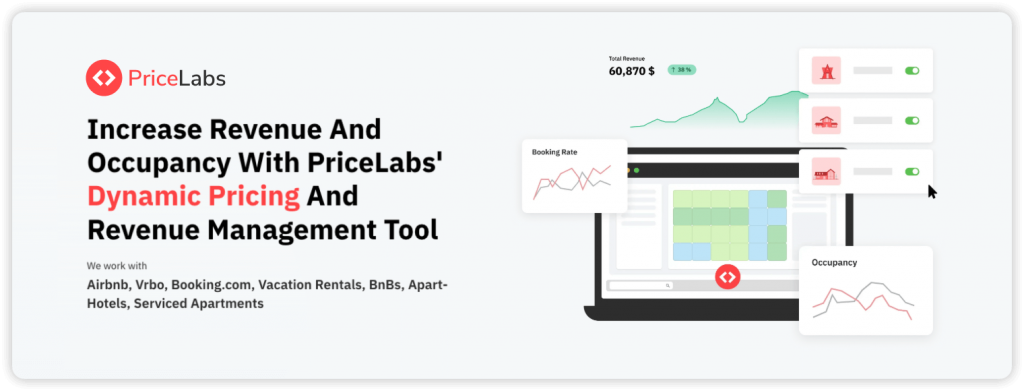
Come guadagnare con Airbnb senza possedere una proprietà?
Anche se non possiedi un immobile, puoi comunque trarre profitto dal mercato in forte espansione di Airbnb. Ecco sei metodi comprovati:
Come funziona: Affitta un immobile a lungo termine (ad esempio, un appartamento o una casa), poi subaffittalo su Airbnb a una tariffa giornaliera più alta. Gestisci le prenotazioni, la comunicazione con gli ospiti e le pulizie, intascando la differenza di profitto.
Ideale per: Principianti con capitale limitato, imprenditori che vogliono testare gli affitti a breve termine senza acquistare un immobile.
Potenziale di profitto: $1.000–$5.000/mese per immobile (dipende dalla posizione e dalla domanda).
2. Gestore di proprietà Airbnb
Come funziona: Gestisci gli annunci Airbnb dei proprietari: gestisci le richieste degli ospiti, coordina le pulizie, supervisiona la manutenzione e ottimizza i prezzi.
Ideale per: Individui organizzati con capacità di assistenza al cliente; ideali per chi ama l'ospitalità.
Potenziale di profitto: 10–30% di reddito da locazione (ad esempio, $500–$2.000/mese per immobile).
Come funziona: Assistere gli host di Airbnb nelle attività quotidiane come l'invio di messaggi agli ospiti, la programmazione delle pulizie e la gestione di check-in/check-out.
Ideale per: Lavoratori part-time o principianti in cerca di un lavoro flessibile e part-time.
Potenziale di profitto: $15–$50/ora o una tariffa fissa per prenotazione (varia in base al carico di lavoro).
Come funziona: Ospita attività a pagamento (ad esempio tour della città, corsi di cucina o laboratori artistici) elencate nelle Esperienze Airbnb.
Ideale per: Persone del posto con competenze uniche o una conoscenza approfondita della propria zona.
Potenziale di profitto: $500–$3.000/mese (i migliori host guadagnano di più).
Come funziona: Offri servizi di pulizia professionale per le proprietà Airbnb tra un soggiorno e l'altro. Crea un team di supporto per crescere.
Ideale per: Individui attenti ai dettagli o imprese di pulizie in cerca di clienti stabili.
Potenziale di profitto: $20–$50 per pulizia (aumento fino a $3.000+/mese con più clienti).
6. Fotografo Airbnb
Come funziona: Scatta foto di alta qualità degli annunci Airbnb per aiutare gli host ad attrarre più prenotazioni.
Ideale per: Fotografi o amatori esperti in fotografia d'interni/immobiliare.
Potenziale di profitto: $50–$300 per inserzione (guadagna $1.000+/mese con clienti costanti).

